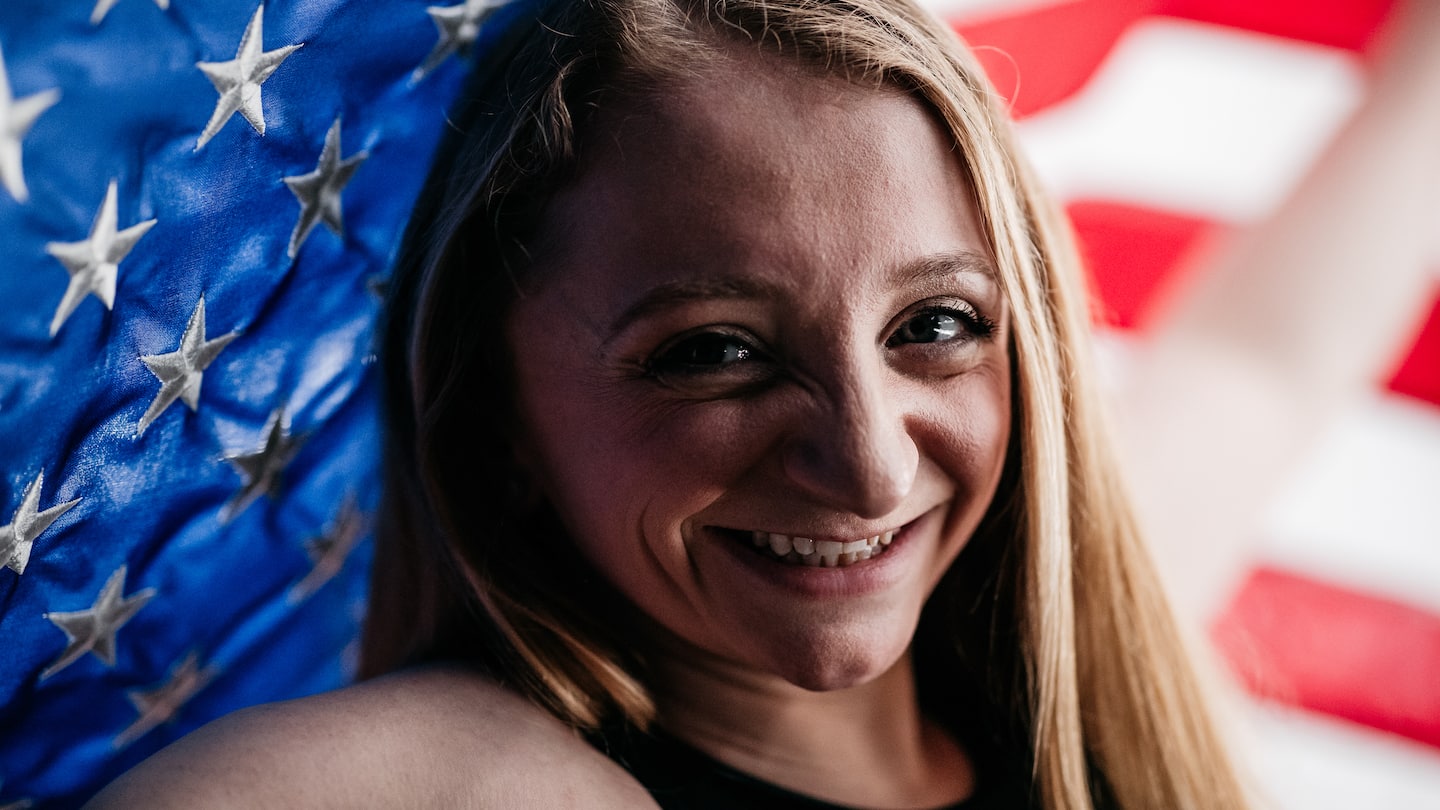
Aiming For Third Games, McKenzie Coan Finds Fewer Broken Bones, More Friends In Pool
by Ryan Wilson

McKenzie Coan smiles and holds up an American flag at a recent photoshoot.
When McKenzie Coan was 7 or 8, she liked sliding on her parents’ hardwood floor without shoes. It was fun, and it felt like she was ice skating.
Her mother, though, did not find this as entertaining. She repeatedly told Coan to stop.
“Well, I actually ended up doing the splits — and I had a spiral fracture,” Coan recalled. “That was not fun, and I felt dumb.”
She also broke her left shoulder not long after.
Coan has a rare condition osteogenesis imperfecta that causes the bones to be brittle. Osteogenesis imperfecta, or OI, affects approximately 1 in every 16,000 to 20,000 births in the United States, according to the National Institutes of Health.
Now 24 years old, Coan estimates she’s had somewhere between 100 and 200 fractures in her life, but she said her “greatest regret in life” is not keeping an exact count.
Nonetheless, those fractures didn’t stop Coan from becoming a Paralympic gold medalist and one of Team USA’s biggest stars going into this summer Paralympic Games in Tokyo.
Coan grew up in a small town two hours away from Atlanta. When she was 5 she tried aqua therapy, but she found herself more interested in competing alongside her two brothers on a local able-bodied swim team. She wanted to take advantage of the much larger pool that was recently built down the road from their house, too.
“I decided I wanted out of the baby pool,” she said. “I begged (my mom), ‘I can race those other kids. I can beat them.’ … I remember telling my mom, ‘You’re sticking me in the baby pool, and I don’t want that anymore.’ She was like, ‘Oh, OK. Let’s go for it.’”
Coan hopped into the eight-lane pool and found equality.
“I didn’t feel different from them,” she said. “I didn’t have to worry about my wheelchair. I did have to worry about not getting hit … but for the most part, I felt like everybody else.”
Two years after being upgraded from the “baby pool,” Coan was approached by a swimming official who told her about the Paralympic Games. She hadn’t heard of the Paralympics before, and neither had her mom. Upon looking into it, Coan ended up joining BlazeSports America, the legacy organization of the Paralympic Games Atlanta 1996 that helps persons with disabilities get involved in Para sports.
Still, Coan never really interacted with many people with OI outside of the hospital. The Osteogenesis Imperfecta Foundation (OIF), a non-profit that supports research of OI, connected Coan’s parents with families of other kids with the same disability, but it was challenging to stay in touch since they were so far away.
“It’s hard because you don’t always hear about the swimmers and athletes with OI out there,” Coan said.
Coan stuck with Para sport and found mentors with OI, like former U.S. Para swimmer Kara Sheridan, along the way. In 2012, Coan made her international debut in Canada, and she went on to compete at the Paralympic Games that summer in London. Four years later in Rio she won four medals, including golds in the 50-, 400- and 100-meter freestyles. Now she’s aiming to compete in a third Paralympic Games this summer in Tokyo.
To help get there, Coan moved to Colorado Springs, Colorado, to train at the United States Olympic & Paralympic Training Center during the pandemic. The elite training there, coupled with fewer races, has allowed her to slow down and focus more on her swimming technique, Coan said.
Now she has her sights set on a new challenge: setting a world record at the Games.
“I really believe I can do it,” she said.
As Coan has advanced in the sport, she said her muscles have become stronger and she has not broken her bones as frequently as she used it. She has had seven or eight surgeries and been in about six limiting body casts, she said. Coan touts herself as being a “get up and move type of person,” and swimming serves as a reminder of the freedom she has.
“My love for swimming goes so far beyond competing, winning medals and breaking records,” she said. “The pool is my sanctuary. I mean that wholeheartedly. It’s given me my freedom obviously.
“If I’m having a bad day, I’ll go swim. If I’m having a great day, I’ll go swim. I actually feel much more at home in the water than I do on land.”
She does not want children with OI to limit themselves based off a fear of breaking a bone. Coan’s parents wanted the same for her.
“They’ve told me before, ‘When we got you into swimming, we wanted you to know that you could do anything you set your mind to at any level,’” she said.